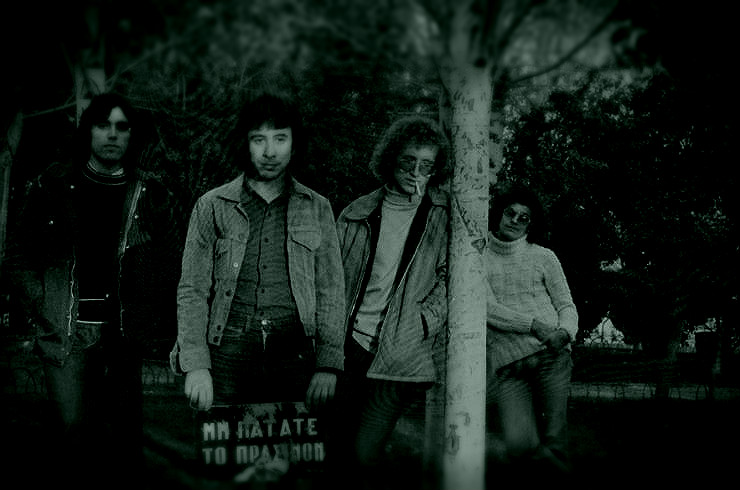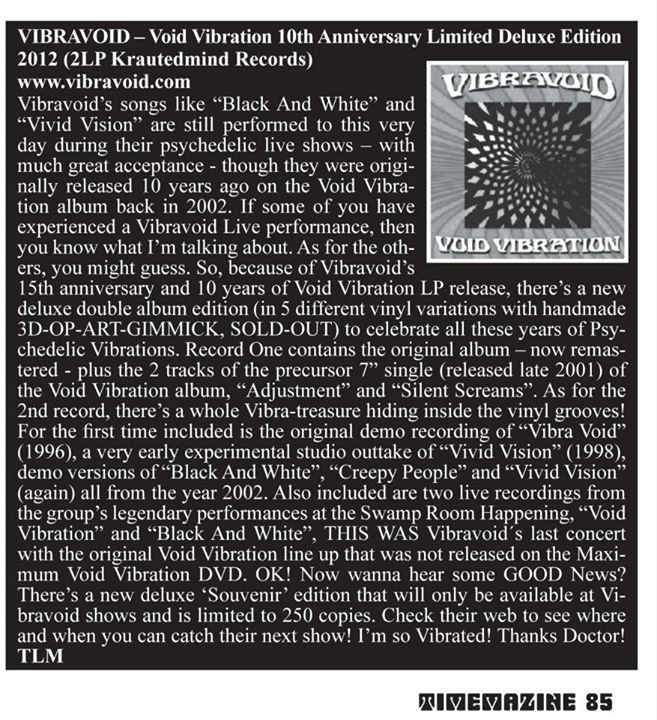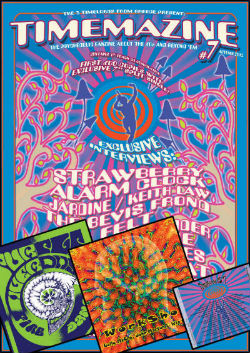
Τα 4 Επίπεδα της Ύπαρξης
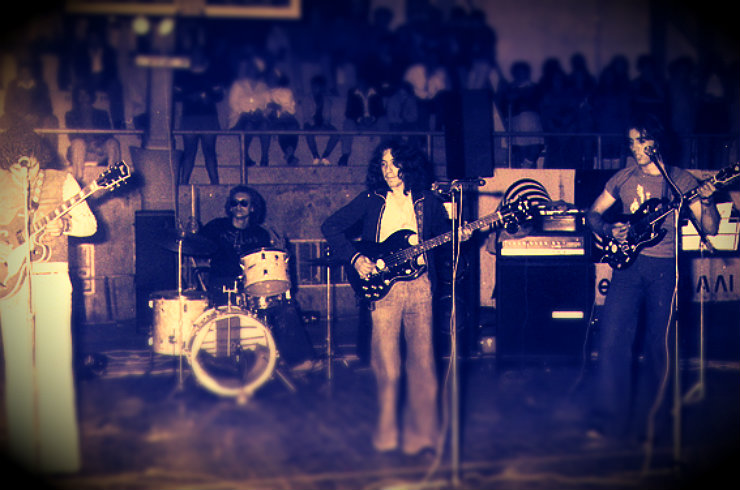
Ο Θανάσης Αλατάς παραχώρησε αυτή τη συνέντευξη στην Αθήνα, στις 19 Σεπτεμβρίου 2010 στον Μιχάλη 'Timelord'. H συνέντευξη πρωτοεκδόθηκε μόνο στα αγγλικά στο φανζίν TimeMazine (τεύχος 5, φθινόπωρο 2010). H απόδοση στα ελληνικά και η επιμέλεια του αγγλικού κειμένου εδώ έγινε από τον Laertis.
Ο Θανάσης Αλατάς - συνθέτης, στιχουργός, κιθαρίστας και ιδρυτικό μέλος των 4 Επιπέδων της Ύπαρξης - είναι ο μοναδικός έλληνας καλλιτέχνης που έχει τιμηθεί με δύο βραβεία Grammy. Αυτό έγινε στις 31 Ιανουαρίου 2010, στην 52η ετήσια τελετή απονομής των Grammy. Πήρε βραβεία για την καλύτερη συνεργασία ράπερ/τραγουδιστή (Jay-Z / Rihanna) και το καλύτερο ραπ τραγούδι ("Run This Town"). Βέβαια ο Αλατάς δεν έχει καμμία σχέση με τη μουσική χιπ-χοπ. Η χιπ-χοπ μουσική απέκτησε σχέση μαζί του, καθώς ο Αλατάς αναφέρεται ως ένας από τους δημιουργούς του "Run This Town" γιατί το συγκεκριμένο τραγούδι χρησιμοποιεί ένα sample από τη σύνθεση «Κάποια μέρα στην Αθήνα» που κυκλοφόρησε αρχικά το 1976 μέσα στο ομώνυμο άλμπουμ του διεθνώς γνωστού και κλασικού πλέον σκληρού ψυχεδελικού ελληνικού γκρουπ Τα 4 Επίπεδα της Ύπαρξης.
Ο καλός φίλος Αλέξης Γεραρδής με έφερε σε επαφή με τον Θ. Αλατά με αποτέλεσμα μια πολύ αποκαλυπτική και ενδιαφέρουσα συνέντευξη. Με αίσθηματα «εθνικής υπερηφάνιας» για τα δύο διεθνή βραβεία αλλά και ηθικής ικανοποίησης (επειδή ήταν rocker και μάλιστα ψυχεδελικός μουσικός από τη χώρα μας που πήρε διεθνή βραβεία κι όχι εκπρόσωπος της εγχώριας σκουπιδο-«λαϊκο-ποπ»), τηλεφώνησα λοιπόν στο Θανάση αλλά με περίμενε και μια ακόμη έκπληξη. «Πηγαίνω στο Λονδίνο σε μερικές μέρες για να πάρω ένα βραβείο από τα Urban Music Awards», μου είπε. (σσ. Τα Urban Music Awards είναι μια διεθνής τελετή βράβευσης καλλιτεχνών στο χώρο των μουσικών χιπ-χοπ, R'n'B, dance και σόουλ). Έπρεπε λοιπόν να αλλάξω έναν αριθμό - από 2 σε 3 - στην πρώτη μου ερώτηση...
Timelord: Πώς αισθάνεσαι που είσαι ο πρώτος Έλληνας που έχει κερδίσει τρία διεθνή μουσικά βραβεία τέτοιου επιπέδου;
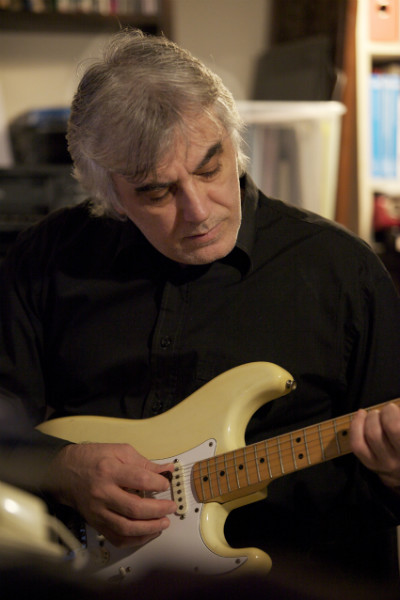 Θανάσης Αλατάς: Τις πρώτες μέρες, όταν συνειδητοποίησα ότι ήμουν ο μοναδικός έλληνας που είχε ποτέ βραβευθεί, αισθάνθηκα έκπληξη, αμηχανία, απορία και ευθύνη. Ξέρω ότι στο εξωτερικό αυτά τα βραβεία έχουν μεγαλύτερη αξία κι αναγνώριση στον κόσμο της μουσικής απ' ό,τι εδώ. Οπότε το μόνο πράγμα που είχα να κάνω, ήταν να το πάρω χαλαρά και να το ευχαριστηθώ με την οικογένεια, τους φίλους και τους συναδέλφους μου.
Θανάσης Αλατάς: Τις πρώτες μέρες, όταν συνειδητοποίησα ότι ήμουν ο μοναδικός έλληνας που είχε ποτέ βραβευθεί, αισθάνθηκα έκπληξη, αμηχανία, απορία και ευθύνη. Ξέρω ότι στο εξωτερικό αυτά τα βραβεία έχουν μεγαλύτερη αξία κι αναγνώριση στον κόσμο της μουσικής απ' ό,τι εδώ. Οπότε το μόνο πράγμα που είχα να κάνω, ήταν να το πάρω χαλαρά και να το ευχαριστηθώ με την οικογένεια, τους φίλους και τους συναδέλφους μου.
Timelord: Πιστεύω ότι ούτε εσύ δεν μπορούσες μα φανταστείς με ποιο ακριβώς τρόπο βρήκαν οι παραγωγοί του Jay-Z ένα τραγούδι μιας ροκ μπάντας με ελληνικό στίχο που είχε κυκλοφορήσει το μοναδικό της άλμπουμ πριν 34 χρόνια και μάλιστα μόνο σε 1000 κόπιες! Τέλος πάντων νομίζω ότι αξίζει να επισημάνουμε το πώς χειρίζονται στην Αμερική τα πνευματικά δικαιώματα των καλλιτεχνών. Αν δεν υπήρχε αυτό το καθεστώς, τίποτε δε θα συνέβαινε. Δε συμφωνείς;
Θ.Α.: O Jay-Z έχει πολλούς συνεργάτες που του προτείνουν διάφορα μουσικά θέματα. Στη δική μου περίπτωση ήταν μάλλον ο εξ ίσου γνωστός Kanye West που του πρότεινε το κομμάτι μας, γιατί ήταν ο παραγωγός του τραγουδιού (σσ. "Run This Town"). Βέβαια η τελική επιλογή έγινε από τον Jay-Z. Αυτό που κατάλαβα από τη συγκεκριμένη συνεργασία είναι ότι πρώτα βάζουν τους δικηγόρους να κάνουν κινήσεις και να λύσουν και την παραμικρή λεπτομέρεια που έχει να κάνει με τα πνευματικά δικαιώματα και μετά μπαίνουν στο παιγνίδι μάνατζερ, παραγωγοί και συμβόλαια. Όλα αυτά γίνονται με πολύ καλή επικοινωνία και με πολύ σοβαρό τρόπο, ώστε το τραγούδι να είναι τελικά επιτυχημένο.
Timelord: Ξέρω ότι είναι κάπως κουραστικό και βαρετό για σένα να δίνεις συνεντεύξεις και να αναγκάζεσαι να λες τα ίδια πράγματα επαναλαμβανόμενα. Αλλά αυτή τη φορά νομίζω ότι αξίζει τον κόπο, γιατί η συνέντευξη θα εκδοθεί στα αγγλικά και θα διαβαστεί από αρκετούς φαν της ψυχεδέλειας σε όλον τον κόσμο. Πολλοί από αυτούς ενδιαφέρονται για την ιστορία σου.
Θ.Α.: Πριν ξεκινήσουμε, πρέπει να σου πω ότι υπάρχουν πολλά λάθη σε όλες τις άλλες συνεντεύξεις που έχουν δημοσιευθεί. Να θεωρήσεις ότι αυτά που θα σου πω τώρα είναι οι πιο σωστές απαντήσεις σε σχέση με ό,τι είχε τότε συμβεί.
Timelord: Ας βουτήξουμε λοιπόν στο χθες. Πώς σου ήρθε να ασχοληθείς με τη μουσική;
Θ.Α.: Το παλιό ραδίοφωνο, οι δίσκοι γραμμοφώνου του πατέρα μου και τα πρώτα τοπικά συγκροτήματα ήταν οι αιτίες που μου δημιούργησαν ενδιαφέρον και αγάπη για τη μουσική. Στα 16 άρχισα να γρατζουνάω τις χορδές μιας κλασικής κιθάρας. Τα πρώτα μαθήματα τα πήρα από φίλους μουσικούς σε άλλα γκρουπ και βέβαια ακούγοντας και «λιώνοντας» βινύλια για να βγάζω κομμάτια.
Timelord: Μίλησέ μας για τα δυτικά προάστεια, τον Άγιο Φανούριο, τους Frog's Eye...
Θ.Α.: Σε ένα μεγάλο αγρόκτημα που είχε και μία δεξαμενή με πολλές πάπιες στο Ίλιο, κοντά στον Άγιο Φανούριο, υπήρχαν πολλά μικρά άθλια εργατικά διαμερίσματα. Έτσι με φθηνό νοίκι κάθε μπάντα μπορούσε να έχει τον ιδανικό προσωπικό χώρο για να παίζει μουσική, μακριά από τα παράπονα των γειτόνων. Ξεκινήσαμε σα μια παρέα φίλων που λεγόταν Frog's Eye μαζί με γκρουπ όπως οι Kάστορες, Emerson, Taste Of Life, Ηλεκτροπληξίας και οι Ξυπόλητοι, κ.ά. Κάθε βδομάδα παίζαμε σε τοπικά σινεμά (σε όλα τα μέρη της Αθήνας). Στην αρχή κάναμε πρόβες με ακουστικές κιθάρες, χωρίς ενισχυτές και με τον ντράμερ να χτυπάει τα γόνατά για να κρατάει το ρυθμό. Ύστερα αγοράσαμε έναν μόνο ενισχυτή και καταφέραμε να συνδέσουμε τα πάντα πάνω του: κιθάρες, μπάσο, μικρόφωνο. Θυμάσαι πώς γίνονταν τα πράγματα τότε... Το Ίλιο ήταν η βάση της επαγγελματικής μπάντας Explosive, ενώ και στους γειτονικούς δήμους υπήρχε σημαντική παρουσία άλλων επαγγελματικών γκρουπ, μερικά από τα οποία συνεχίζουν να υπάρχουν μέχρι σήμερα, όπως οι Πυξ Λαξ και οι Τσοπάνα Rave. Το πρωί της 6ης Ιουλίου 1973 στο σινεμά Άλσος παίξαμε την πρώτη μας συναυλία μαζί με τους Emerson και τους θρυλικούς Κάστορες.
Timelord: Από τον πυρήνα των Frog's Eye φτιάχτηκαν τα 4 Επίπεδα της Ύπαρξης. Πώς ήρθες σε επαφή με τους άλλους; Πού και πότε;
Θ.Α.: Μετά την αποχώρηση του Δημήτρη Κατσικάρη (μπάσο, φωνή) από τους Frog's Eye, ο Χρήστος Βλαχάκης (ντραμς) κι εγώ ψάξαμε για μέλη που ήταν επαγγελματίες μουσικοί. Μέσω μιας αγγελίας στο περιοδικό Pop Eleven συναντήσαμε τον Μάριο Γιαμαλάκη (μπάσο, φωνή), ενώ μετά από σύσταση από ένα φίλο ήρθε και ο Νίκος Δούναβης (κιθάρα). Ξεκινήσαμε πρόβες σε ένα ανήλιαγο υπόγειο στο Μπουρνάζι, αποφασίζοντας να εκφραστούμε με ελληνικό στίχο. Ήταν αρχές του 1974 όταν ξεκινήσαμε να λεγόμαστε Τα 4 Επίπεδα της Ύπαρξης. Το πρώτο μας λάιβ έγινε στη μεγάλη συναυλία ποπ για την κατεχόμενη Κύπρο το 1975 στο Σπόρτινγκ, μαζί με τον Κώστα Τουρνά, την Ελπίδα, τον Πασχάλη κ.ά. Υποτίθεται ότι θα παίζαμε 2-3 τραγούδια αλλά τελικά παίξαμε για 45 λεπτά! Εκείνη τη χρονιά το ΕΙΡΤ (σσ. πρόγονος της ΕΡΤ) οργάνωσε ένα διαγωνισμό μουσικών συγκροτημάτων. Ο μεγάλος σύγχρονος μουσικοσυνθέτης Στέφανος Βασιλειάδης μας άκουσε και πρότεινε να συμμετέχουμε. Στις 16 Σεπτεμβρίου 1975 έγινε ψηφοφορία του κοινού και βγήκαμε τρίτοι με αποτέλεσμα να γράψουμε σε βίντεο μια σειρά τραγουδιών που παίζονταν από το ΕΙΡΤ ανάμεσα στις εκπομπές σε μουσικά διαλείμματα, επαναληπτικά πολλές φορές την ημέρα για 6-7 μήνες.
Timelord: Ποιες ήταν οι επιρροές σας και πώς θα ονόμαζες το μουσικό σας στυλ;
Θ.Α.: Παρά το γεγονός ότι είχαμε και πολλά ξένα κομμάτια στο ρεπερτόριό μας, όταν γράφαμε το δικό μας υλικό, ήμασταν πολύ μακρυά από το να μπορούμε να κατηγοριοποιηθούμε σε κάποιο συγκεκριμένο είδος μουσικής. Ο καθένας μας έφερνε στο συγκρότημα τις δικές του επιρροές στον ήχο. Εμένα μου άρεσε το δημοτικό τραγούδι και φυσικά η ψυχεδέλεια, ο Μάριος γούσταρε τον Dylan και το Σαββόπουλο. Ο Χρήστος, που ήταν ο πρώτος λαϊκός rocker, τα άκουγε όλα. Όλα αυτά υπήρχαν στο υλικό μας και φυσικά οι ελληνικοί στίχοι δεν είχαν καλή φήμη εκείνες τις μέρες, αλλά ήταν τόσο δυνατοί που όλο και περισσότεροι άνθρωποι άρχιζαν να τους ακούνε. Σήμερα, όλα αυτά δίνουν την εντύπωση μιας περίεργης μουσικής κολλεγιάς. Κάποιοι μας έχουν χαρακτηρίσει ως ψυχεδελικό ροκ συγκρότημα, κάποιοι άλλοι ως progressive.
Timelord: Διακρίνω αρκετά στοιχεία δημοτικής μουσικής. Πώς έγινε αυτό;
Θ.Α.: Η συλλογή βινυλίων με δημοτικά του πατέρα μου είναι ένας λόγος. Άλλος λόγος είναι η ούτως ή άλλως βαθιά σχέση που έχω με τη μουσική γενικά, η οποία πιστεύω ότι ακόμη δεν έχει ολοκληρώσει την πορεία της. Αλλά πιστεύω ότι και τα άλλα μέλη του γκρουπ γούσταραν.
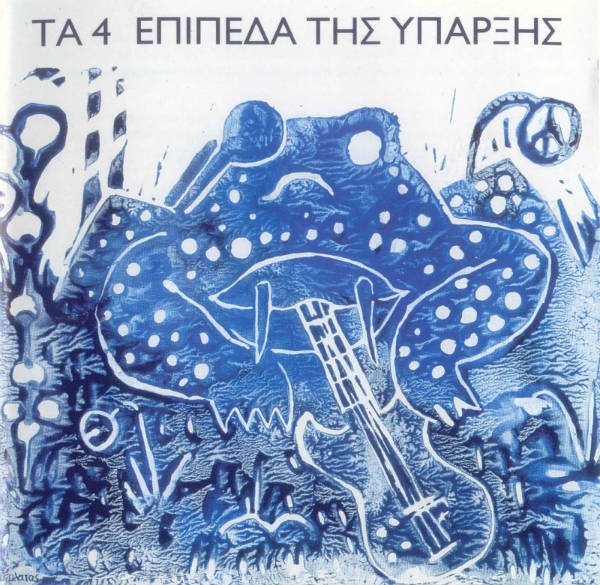 Timelord: Στις 5 και 6 Ιανουαρίου 1976 στο στούντιο ΙΙΙ της Κολούμπια-ΕΜΙ ηχογραφήσατε το άλμπουμ σας χωρίς παραγωγό! Δεν μπορώ να καταλάβω ακόμη και σήμερα πώς προέκυψε το συμβόλαιο με τη λαϊκο-δημοτική εταιρεία δίσκων Venus.
Timelord: Στις 5 και 6 Ιανουαρίου 1976 στο στούντιο ΙΙΙ της Κολούμπια-ΕΜΙ ηχογραφήσατε το άλμπουμ σας χωρίς παραγωγό! Δεν μπορώ να καταλάβω ακόμη και σήμερα πώς προέκυψε το συμβόλαιο με τη λαϊκο-δημοτική εταιρεία δίσκων Venus.
Θ.Α.: Μέσα από τις εμφανίσεις μας στην ελληνική τηλεόραση, τα στελέχη της Venus έδειξαν κάποιο ενδιαφέρον για μας και μας πρότειναν να κάνουμε ένα δίσκο. Η Venus ήταν μια μικρή εταιρεία δίσκων με ρεπερτόριο στο δημοτικό και το λαϊκό τραγούδι. Δεχτήκαμε αλλά θέλαμε να ξαναπαίξουμε τα τραγούδια με τον νέο μας κιθαρίστα Nίκο Γράψα (που προηγούμενα έπαιζε μπάσο σε ένα γκρουπ από το Περιστέρι που λεγόταν Πάραλος). Έτσι, μετά την αποχώρηση του Νίκου Δούναβη εξαιτίας της στρατιωτικής του θητείας - τότε ήταν 26 μήνες - ξεκινήσαμε τη νέα και τελική σύνθεση του γκρουπ. Είχαμε αρκετό υλικό και ξέραμε πώς ακριβώς θέλαμε να είναι ο ήχος μας. Ταιριάξαμε τέλεια με το Νίκο Γράψα, που ήταν καταπληκτικός μουσικός. Εκείνη την εποχή πειραματιζόμασταν πιο έντονα με τις επιρροές μας από την παράδοση. Για τις ανάγκες της ηχογράφησης προσθέσαμε βιολί σε κάποια τραγούδια, το οποίο έπαιζε ο νεαρός ερασιτέχνης μουσικός Γιάννης Δεσποτίδης. Οι ατέλειωτες πρόβες μας κράτησαν μέχρι το Δεκέμβρη του 1975. Στο μεταξύ κάναμε και τη μοναδική μας εμφάνιση με αυτή τη σύνθεση την 1η Δεκεμβρίου 1975 στον κινηματογράφο Οπτασία στη περιοχή του Αγίου Παύλου. Ήταν πρωινή συναυλία, στις 11πμ, μαζί με τους Paradise Viza και Πλεξίσαργος, με εισιτήριο 30 δραχμές. Μας είχε προσκαλέσει ο καλός μας φίλος Δημήτρης Δημητράκας που νομίζω ότι τότε έπαιζε με ένα από τα άλλα γκρουπ.
Στο στούντιο ΙΙΙ της Κολούμπια δεν ήξεραν ότι ήμαστε ροκ συγκρότημα και δεν είχαν προβλέψει ότι χρειαζόμασταν παραγωγό. Έτσι όταν μπήκαμε στο στούντιο, μας κοίταξαν, μας μέτρησαν και οι ηχολήπτες ρώτησαν πού είναι το μπουζούκι! Λοιπόν κάλυψα εγώ μερικώς την απουσία παραγωγού, καθώς ήμουν ο συντονιστής του δίσκου και ο άνθρωπος που επικοινωνούσε με την εταιρεία. Η ηχογράφηση έγινε στερεοφωνικά σε μόλις δύο ημέρες, στις 5 και 6 Ιανουαρίου. Δέκα ώρες όλες κι όλες, 3μμ με 8μμ κάθε μέρα. Αυτό ήταν όλο! Ήμασταν όλοι σε ένα δωμάτιο και παίζαμε και δεν είχαμε ιδέα πώς ακουγόμαστε και αν όλα πήγαιναν καλά. Την πρώτη μέρα γράψαμε τη μουσική και το βιολί. Τη δεύτερη μέρα προσθέσαμε τα φωνητικά. Μετά από αρκετό καιρό μας έφεραν ένα δείγμα βινυλίου χωρίς να έχει γίνει μίξη για να το ακούσουμε αν είναι καλό και να το εγκρίνουμε. Όταν το πρωτακούσαμε, ήμαστε τόσο ενθουσιασμένοι που δεχτήκαμε να κυκλοφορήσει.
Timelord: Το άλμπουμ κυκλοφόρησε σε μόλις 1000 κόπιες (πράγμα που το έκανε τελικά δυσεύρετο και αρκετά ακριβό σήμερα) χωρίς ιδιαίτερο θόρυβο. Αυτό που δεν καταλαβαίνω είναι ότι, ενώ αρκετές άλλες μπάντες της εποχής (σσ. για την ακρίβεια ελαφρά προγενέστερες) με ελληνικό στίχο, όπως οι Πελόμα Μποκιού, οι Νοστράδαμος και οι Poll, ήταν αρκετά επιτυχημένες, εσείς δεν ήσαστε. Πώς το εξηγείς; Ήταν πιθανά το γεγονός ότι ήσαστε μπροστά από την εποχή σας, μουσικά και στιχουργικά;
Θ.Α.: Δεν είχαμε ουσιαστική βοήθεια και επιπλεόν η Venus δεν ήταν αρκετά δυνατή στη διανομή και τη διαφήμιση. Η Venus είχε μια ραδιοφωνική εκπομπή διάρκειας μόνον 15 λεπτών, όπου ανάμεσα στα δημοτικά μπορούσες να ακούσεις και κανένα δικό μας κομμάτι. Ο Μάριος έπρεπε να πάει στρατό, εγώ ήμουν επόμενος και ακολουθούσε και ο Χρήστος. Δεν μπορούσαμε να υποστηρίξουμε το δίσκο με συναυλίες, ούτε να κάνουμε προώθηση μόνοι μας. Έτσι τελείωσε η ιστορία των 4 Επιπέδων της Ύπαρξης, αφήνοντας πίσω πολλές όμορφες μουσικές αναμνήσεις αποτυπωμένες σε ένα βινύλιο. Αν το άλμπουμ ήταν μπροστά από την εποχή του, δεν το ξέραμε τότε, αλλά αισθανόμαστε ότι είχαμε καταφέρει να «γράψουμε» μοναδικά και ανεξίτυλα ένα μέρος από τα νεανικά μας μουσικά όνειρα. Εκτός αυτού, η αναγνώριση ήρθε πρώτα από το εξωτερικό και μετά σιγά-σιγά και από την Ελλάδα. Είναι η μοναδική περίπτωση που κάτι τέτοιο συνέβη σε ελληνόφωνο συγκρότημα.
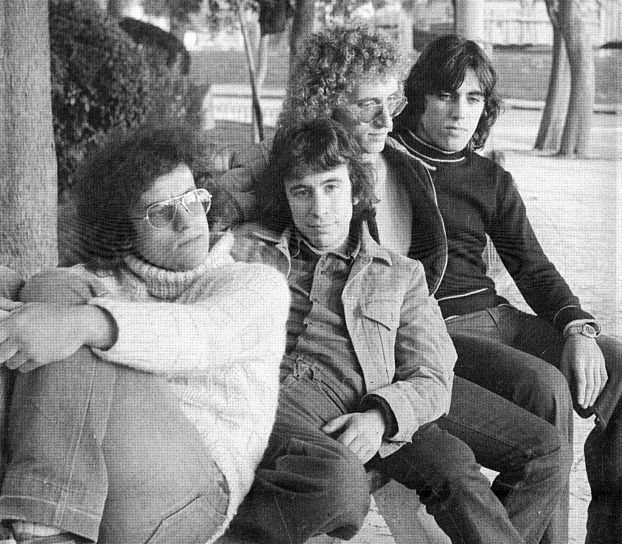 Timelord: Ας εστιάσουμε τώρα στους στίχους του δίσκου. Πιστεύω ότι παρά το γεγονός ότι ο δίσκος βγήκε μετά τη μεταπολίτευση, στα τραγούδια είναι έντονο το στοιχείο του συμβολισμού. Πιθανά για να αποφύγετε τη λογοκρισία; «Σαν λιώσουνε τα χιόνια θα υψώσω την φωνή μου»... Βέβαια σε άλλα τραγούδια υπάρχει πιο προφανές νόημα, «...κι ο ξένος θα 'ναι αδελφός.» Μουσικά αναπτυχθήκατε εν μέσω δικτατορίας. Πώς σας επηρέασε αυτό;
Timelord: Ας εστιάσουμε τώρα στους στίχους του δίσκου. Πιστεύω ότι παρά το γεγονός ότι ο δίσκος βγήκε μετά τη μεταπολίτευση, στα τραγούδια είναι έντονο το στοιχείο του συμβολισμού. Πιθανά για να αποφύγετε τη λογοκρισία; «Σαν λιώσουνε τα χιόνια θα υψώσω την φωνή μου»... Βέβαια σε άλλα τραγούδια υπάρχει πιο προφανές νόημα, «...κι ο ξένος θα 'ναι αδελφός.» Μουσικά αναπτυχθήκατε εν μέσω δικτατορίας. Πώς σας επηρέασε αυτό;
Θ.Α.: Υπάρχουν αρκετά τραγούδια που δεν μπήκαν στο άλμπουμ καθώς και τραγούδια του άλμπουμ όπως τα «Ο αγώνας μας» και «Σαν λιώσουνε τα χιόνια» που περιγράφουν την όλη κατάσταση. Άλλα τραγούδια μας είναι αποτέλεσμα μιας πολύ διαφορετικής, αποστασιοποιημένης καλλιτεχνικής έκφρασης. Από την εποχή που κολλούσαμε παράνομα αφίσες στο δρόμο το 1972-73 με τους Frog's Eye μέχρι την κυκλοφορία του δίσκου μας το 1976 και τη μεταπολίτευση, υπήρχε διαρκώς λογοκρισία στα τραγούδια μας. Ως νεαροί μαθητές σε αυτούς τους δύσκολους καιρούς συμμετείχαμε στους κοινωνικο-πολιτικούς αγώνες και επιπλέον είχαμε ανησυχία και αγάπη γι' αυτό που κάναμε.
Timelord: Το εικαστικό στο εξώφυλλο του άλμπουμ το έχεις κάνει εσύ. Πες μας μερικά πράγματα γι' αυτό.
Θ.Α.: Είχα σχεδιάσει 4-5 μονοτυπίες με σκοπό να χρησιμοποιηθούν ως εξώφυλλα για ένα πιθανό άλμπουμ των Frog's Eye. Εξ ου και ο μονόφθαλμος βάτραχος. Ήμουν ο μόνος που ασχολήθηκε με το εξώφυλλο. Οι φωτογραφίες για το άλμπουμ τραβήχτηκαν στο κέντρο μιας μικρής τότε πλατείας στο Μπουρνάζι, όταν δεν υπήρχαν τα μαγαζιά που υπάρχουν σήμερα. Σήμερα αυτό το εξώφυλλο είναι σημαντικό στοιχείο για την αναγνώριση, την προώθηση και τη διανομή του δίσκου.
Timelord: Αμέσως μετά την κυκλοφορία του δίσκου, το συγκρότημα διαλύθηκε λόγω στρατιωτικών υποχρεώσεων. Το 1980, όταν προσπαθήσατε να το ξαναφτιάξετε, σας έκλεψαν δύο φορές τα όργανα. Κάπως έτσι αφήσατε το άλμπουμ στην τύχη του (αν και τελικά αποδείχθηκε πολύ τυχερό) και ο καθένας τράβηξε το δρόμο του...
Θ.Α.: Ήμουν ο μόνος που ενδιαφερόμουν για το δίσκο. Παρ' όλα αυτά, προσπάθησα να αγοράσω από την εταιρεία τα υπόλοιπα δικαιώματα, έτσι για να μην είναι σε ξένα χέρια, χωρίς να γνωρίζω τότε ούτε εγώ ούτε η εταιρεία κάτι για το μέγεθος της επιτυχίας του στο εξωτερικό. Το νέο γκρουπ είχε μια πειραματική σύνθεση που περιλάμβανε νέο κιθαρίστα, τον Δημήτρη Κατσικάρη από την πρώτη μορφή των Frog's Eye. Ως ιδρυτές, επιμέναμε να παραμένουμε ερασιτέχνες. Τελικά και αυτή η νέα προσπάθεια σταμάτησε επειδή μας έκλεψαν τον εξοπλισμό και βέβαια εξαιτίας και των αλλαγών που η μεταπολίτευση είχε επιφέρει στη μουσική με αποτέλεσμα την κυριαρχία άλλων «χώρων έκφρασης».
Η πορεία του Νίκου Γράψα ως συνθέτη είναι γνωστή. Ίδρυσε τις Δυνάμεις του Αιγαίου, τους Άβατον και άλλα σχήματα παραδοσιακής μουσικής. Είναι ένας αναγνωρισμένος ερευνητής, συνθέτης και μουσικός.
Ο Μάριος Γιαμαλάκης το 1983 έγραψε μαζί με άλλους φίλους το πρώτο του προσωπικό άλμπουμ Εντός Σχεδίου Πόλεως, στο οποίο συμμετείχα κι εγώ. Το 2004 έκανα την παραγωγή στο δεύτερό του προσωπικό άλμπουμ (που διατέθηκε μέσω internet). Παραμένει ένας ευαίσθητος καλλιτέχνης.
Ο Χρήστος Βλαχάκης ζει στην Ολλανδία και επισκέπτεται την Ελλάδα κάθε καλοκαίρι με την οικογένειά του.
Timelord: Μίλησέ μας για τη δεύτερη περίοδο του γκρουπ που ξεκίνησε το 1996 όταν η ετικέτα Wipe-Out! επανέκδοσε το άλμπουμ σας και κρατάει ως τις μέρες μας.
Θ.Α.: Υπάρχει μόνο μία περίοδος για τη μπάντα. Όλα όσα έγιναν στη συνέχεια μέχρι σήμερα σχετίζονται με το δίσκο. Φαίνεται ότι ο δίσκος θύμωσε με μας που τον παρατήσαμε το 1976 κι αποφάσισε να τα κάνει όλα μόνος του και μάλιστα με μεγάλη επιτυχία! Είκοσι χρόνια αργότερα χωρίς να το ξέρουμε κυκλοφόρησε πάλι στα δισκάδικα! Ήταν πρωτοβουλία των δύο ιδιοκτητών της Wipe-Out!, του Θοδωρή Κρίθαρη και του Γρηγόρη Βάιου, την όποια εκτίμησαμε κι έτσι βοηθήσαμε για το σχεδιασμό και την εκτύπωση ενός ενθέτου με επιπρόσθετες πληροφορίες. Ήταν τότε που τελικά απόκτησα τα πλήρη δικαιώματα για το δίσκο με τη σκέψη να τον κυκλοφορήσω στο μέλλον σε CD.
Timelord: Κάπου διάβασα ότι υπάρχουν σκέψεις για μια ακόμη επανέκδοση του δίσκου με επιπλέον υλικό. Είναι αλήθεια;
Θ.Α.: Υπάρχει κάποιο υλικό από ντέμο που ηχογραφήθηκαν το 1975-1976 και αρκετά τραγούδια που δεν ηχογραφήθηκαν τότε. Υπάρχει ακόμη - και το ψάχνω επίμονα στο αρχείο της ΕΡΤ - όλο το υλικό από τα βίντεο του ΕΙΡΤ το 1975 και 1976 που περιλάμβαναν ακυκλοφόρητα τραγούδια και τραγούδια από το άλμπουμ. Η απόφαση τώρα (για νέα επανέκδοση) είναι μελλοντική υπόθεση.
Timelord: Σκέφτεστε να επανενωθείτε έστω και για τζαμάρισμα; Ή πιθανά για εμφάνιση στο Ilion Rock Live;
Θ.Α.: Τα τελευταία Χριστούγεννα πήρα την πρωτοβουλία και μετά από 33 χρόνια βρεθήκαμε και τζαμάραμε για 2-3 ώρες σε ένα στούντιο στο Ίλιο. Πιθανές μελλοντικές εμφανίσεις ή κυκλοφορίες είναι μια άλλη υπόθεση.
Timelord: Mama Africa Art Festival... Είσαι ένας από τους διοργανωτές...
Θ.Α.: Όπως και με το Ilion Rock Live Festival, το ίδιο συμβαίνει και με το Mama Africa Art Festival - είμαι ένα από τα βασικά ιδρυτικά μέλη της οργανωτικής επιτροπής. Αυτόν τον καιρό συνεργάζομαι και κάνω δύο παραγωγές για τα συγκροτήματα Rebetoven και September. Ειδικά με τους September ετοιμάζομαι να κάνω παραγωγή σε μια σειρά δικών μου τραγουδιών και πιστεύω ότι με τη βοήθειά τους θα μπορέσω να τα παρουσιάσω κάποια στιγμή.
Timelord: Το τραγούδι των Simple Minds "Film Theme" (από το άλμπουμ Real to Real Cacophony) που κυκλοφόρησε το 1979 είναι νότα-προς-νότα ίδιο με το τραγούδι σας «Του τρελού η σάλπιγγα». Υπενθυμίζω ότι το δικό σας άλμπουμ βγήκε το 1976...
Θ.Α.: Δεν θέλω να το σχολιάσω. Όταν ειδοποιήσαμε την εταιρεία μας, απλά αδιαφόρησαν. Ο καθένας μπορεί να ακούσει και να συγκρίνει τα δύο κομμάτια.
Timelord: Τελειώνοντας θέλω να πω ότι - δεν ξέρω για σένα - αλλά εγώ ως φίλος της μουσικής αυτού του είδους, αισθάνομαι αρκετά περήφανος που η Ελλάδα έβγαλε ένα συγκρότημα σαν Τα 4 Επίπεδα της Ύπαρξης...
Θ.Α.: Όλοι μας αισθανόμαστε χαρούμενοι και περήφανοι. Και αυτό που συμβαίνει με το τραγούδι ("Run This Town") δεν έχει προηγούμενο ούτε στην αμερικάνικη μουσική βιομηχανία, καθώς έχει προταθεί για ακόμη έντεκα βραβεία μέσα στο 2010!!! Θα ήθελα να κλείσω με ένα απόσπασμα από το λόγο που θα πω στην απονομή των Urban Music Awards:
«Εκείνες οι στιγμές δέθηκαν με τα όνειρά μας, καθώς υπομονετικά αφιερώσαμε τον περισσότερο από τον ελεύθερο χρόνο της εφηβείας μας μελετώντας μουσική και φτιάχνοντας συγκροτήματα για μία συναυλία ή ακόμα και για μια πρόβα. Το βραβείο αφιερώνεται σε όλη την κοινότητα των μουσικών που εκείνη την εποχή έδωσαν όλον τους τον εαυτό για να εκπληρώσουν τα όνειρά τους για τη ζωή μέσα από τη μουσική, οι περισσότεροι χωρίς καν να γευτούν την ικανοποίηση ενός recording session, αν και πολλοί από αυτούς δικαιούνταν περισσότερα από εμάς.
Πριν από μας πολλοί έπαιξαν καλύτερη μουσική και μετά από μας πολλοί θα γράψουν ακόμη καλύτερη μουσική.»
Ακολουθεί το κείμενο της συνέντευξης στα αγγλικά:
Athanassios Alatas is interviewed by Timelord Michalis (Athens, September 19th 2010). The interview was first published on issue #5 of the TimeMazine fanzine during the autumn of 2010. It's now published in greek for the first time.
Athanassios Alatas, composer, lyricist, rhythm/acoustic guitarist and founding member of the band The 4 Levels of Existence, is the only Greek artist who was honoured with two Grammy's, on January 31st 2010 at the 52nd Annual Grammy Awards. He received Grammy's for Best Rap/Sung Collaboration (Jay-Z / Rihanna) and for Best Rap Song (“Run This Town”). No, Athanasios Alatas has nothing to do with hip hop music. Hip hop has something to do with him! Alatas is one of the composers of "Run This Town" since the song is 'borrowing' a sample from the composition "Kapia Mera stin Athena" ("Someday in Athens") that was originally included in the self-titled album of this internationally renowned classic greek hard/psych rock band Ta 4 Epipeda tis Yparxis (The 4 Levels of Existence) released in 1976.
My good friend, musician Alexis Gerardis put me in contact with Mr. Alatas for a highly revealing and interesting interview. Trying to refresh my list of questions and having an intense feeling of 'national pride' for the two international music awards alongside a sentiment of 'ethical satisfaction' (because it was a psychedelic rock act from my country that reached the highest distinction instead of any local trash / second class pop-dance act), I phoned Thanassis (as he's called) for the latest details not expecting to find myself facing a new surprise! Alatas' first words were "I’m heading for London in a few days to receive another award from the Urban Music Awards" (note: The Urban Music Awards is an international hip hop, R&B, dance and soul music awards ceremony). So my first question had to be slightly altered in numerical terms (two awards now becoming three).
Timelord: How do you feel being the first Greek musician to have won three international music awards of this calibre?
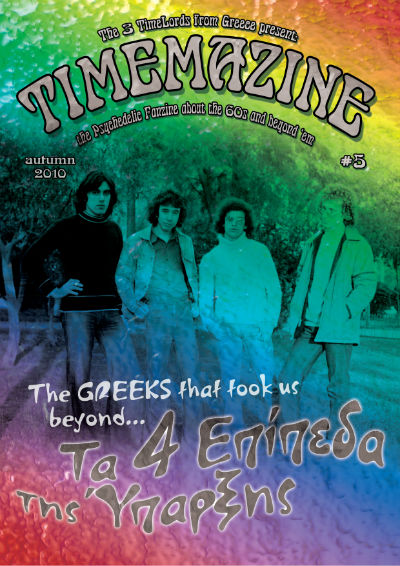 Thanassis Alatas: The first days, when I realized that I was the only Greek ever awarded, I had mixed feelings of surprise, perplexity, query and responsibility. I knew that abroad these awards had much more value and recognition in the music industry than locally; so the only thing I did was to relax and enjoy the situation with my family, friends and colleagues.
Thanassis Alatas: The first days, when I realized that I was the only Greek ever awarded, I had mixed feelings of surprise, perplexity, query and responsibility. I knew that abroad these awards had much more value and recognition in the music industry than locally; so the only thing I did was to relax and enjoy the situation with my family, friends and colleagues.
Timelord: I believe that you probably could not have guessed how on earth Jay Z's producers had discovered a song by a greek-speaking rock band that had their sole album released 34 years ago in a limited edition of just 1000 copies! Anyway I think it's important for us to focus on the way they deal with the artists' copyrights in the US. Had they not followed certain legal procedures, nothing would have happened to affect you, don't you think so?
T.A.: Jay Z has a lot of people working with him who suggest various musical themes (like my song); in my case the song was probably chosen by the equally successful Kanye West who is the producer of "Run This Town". Of course the final choice was made by Jay-Z himself. What I learned from this cooperation is that their lawyers make the first moves to resolve even the slightest royalties-related issues before any managers, producers and contracts come in the picture. All these take place with serious communications and deals, so that there won't be any legal problems if the song is a success!
Timelord: I know it's a little tiresome and boring for you to answer the same interview questions over and over. But I believe this time it's worth the effort because this interview will be translated into english and published in a psychedelic 'zine that's read by a lot fans of our music worldwide. A lot of these people could be interested in your story.
T.A.: Before we start, I must tell you that there were a lot of mistakes in our previously published interviews. You must consider that in this interview you'll get the most exact descriptions of what happened back then.
Timelord: OK, let's dive into the past. Why were you interested in music making in the first place?
T.A.: Our old radio at home, my father's gramophone records and the first local bands in the city were the cause of me getting interested in and loving music. At the age of sixteen I started plucking the strings of a classical guitar. I got my first lessons from musician friends who were members of other groups, at the same time trying to figure out things by myself by endlessly listening and 'plowing' vinyl records till I could get their musical motives.
Timelord: Tell us about the scene in the west suburbs (of Athens) at the time - Ilion, Saint Fanourios - and Frog's Eye...
T.A.: There was a big croft with a water tank with lots of ducks in the city of Ilion, near the church of Saint Fanourios; nearby you could find a number of small miserable apartments where workers used to stay in the old days. So with a cheap rent a band could have its own 'ideal' private place to jam, away from neighbours' complaints. We started as a band made up by friends, calling ourselves Frog's Eye. Other bands in the neighbourhood at the time were Kastores ('Beavers'), Emerson, Taste of Life, Electroplexias ke i Xypoliti ('The Electrocuted & The Barefoot') etc. Every week we played at local cinemas all over Athens. At first we rehearsed with acoustic guitars, no amplifiers, while the drummer had to hit his knees to keep the beat. Next, we bought just one amp and we managed to play all instruments through it: guitars, bass, mic. You remember how things were back then... Ilion was also the home base of the professional band Explosive and there was a measurable presence of professional groups in nearby neighbourhoods; some of them still go on today, like Pyx Lax and Tsopana Rave. In the morning of July 6th 1973 at the Alsos cinema we played our first concert together with Emerson and the legendary Kastores.
Timelord: It was the core of Frog's Eye that evolved into The 4 Levels of Existence. How did you get in touch with the others in the band? Where and when did all this happen?
T.A.: After the departure of Dimitris Katsikaris (bass, vocals) from Frog's Eye, Christos Vlahakis (drums) and I looked for more professional band members. Through an ad in the 'Pop Eleven' magazine we found Marios Giamalakis (bass, vocals) and a friend recommended Nikos Dounavis (guitar) who also joined the band. We started rehearsing in a dark basement in Bournazi, dedicated to express ourselves in the greek verse. It was early 1974 when we started calling ourselves 'The 4 Levels of Existence'. Our first live gig was at a large Pop Concert for Occupied Cyprus (it was the time of the Turkish invasion of Cyprus of '74) that took place in 1975 at Sporting (a basketball court); other participants were Kostas Tournas (ex-Poll), Elpida, Paschalis (ex-The Olympians) etc. We were supposed to play just two or three songs but eventually we played for 45 minutes! It was the same year when the Greek Radio & Television (EIRT) organized a band contest. The contemporary music composer Stefanos Vasileiadis heard about us and proposed that we participated. On September 16th 1975 the audience voted us in the third place and as a result we video-taped a series of songs that were transmitted as musical intermissions on state TV a lot of times, on a daily basis for about 6-7 months.
Timelord: Which were the band's influences and how would you describe your style of music?
T.A.: Despite the fact that we had a number of international songs in our repertoire, when we wrote our own stuff one could not easily classify us under a specific rock music genre. Each one of us brought to the band their own musical influences. Personally I was fond of Greek traditional music and of course psychedelic rock, Marios was fond of Bob Dylan and (local beatnik/singer-songwriter) Dionyssis Savvopoulos. Christos, who was amongst the first 'pop'-rockers, listened to just about everything. All these comprised our material; another thing was that Greek lyrics didn't have a good reputation amongst local rock bands in those days, but they were so powerful that more and more people started to listen to them. These elements combined can nowadays give the impression of a rare musical recipe. Some people have listed us as a psychedelic band, others as a progressive band.
Timelord: One can detect in your songs enough elements of traditional Greek music. Can you explain how exactly did this happen?
T.A.: My father's collection of vinyl records of traditional/folk music is a reason. Anyway another reason is my deep relation to music in general; I believe I haven't completed my musical explorations yet. The other band members were also digging these experiments.
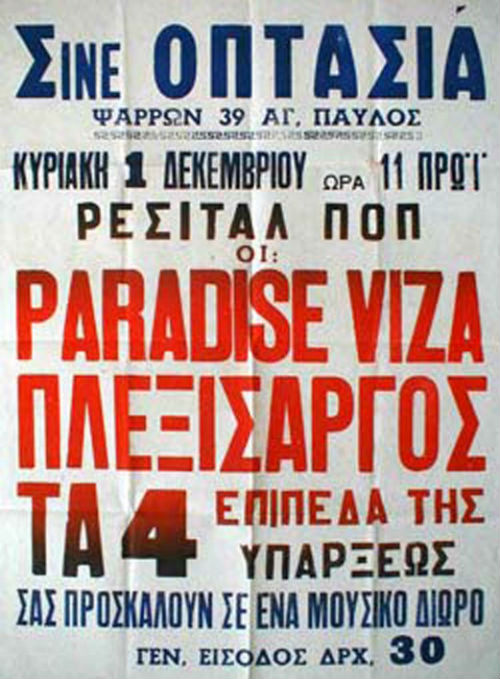 Timelord: During January 5th & 6th 1976 at Columbia-EMI's studio III you recorded your sole album without a producer. I can't understand what made a popular/folk music label, Venus Records, offer you - a rock band - a recording contract.
Timelord: During January 5th & 6th 1976 at Columbia-EMI's studio III you recorded your sole album without a producer. I can't understand what made a popular/folk music label, Venus Records, offer you - a rock band - a recording contract.
T.A.: The executives of Venus Records saw us on TV, showed some interest in us and finally proposed that we recorded an album for them. Venus was a small local label with a folksy and traditional music repertoire. We accepted but we wanted to play the songs with our new guitarist Nikos Grapsas, who was previously the bass guitarist for a group from Peristeri called Paralos. After Nick Dounavis' departure to join the army (in Greece service in the army is obligatory and in the 70s it was 26-months long), we had formed a new (the final) line-up of the band. We had enough material and had in mind exactly how we wanted to sound. There was a perfect musical match with Nikos Grapsas who was (and still is) an amazing musician. In that phase we were intensely experimenting with our traditional music influences. For the needs of the recording we also added some violin to a few songs, which was played by the young amateur violinist Yiannis Despotidis. Our endless rehearsals lasted till December 1975. In the meantime we played our only live gig with this line-up on December 1st 1975 at the Optasia cinema in the neighbourhood of Saint Paul. It was a morning concert, at 11 am; we shared the bill with Paradise Viza and Pleksisargos, and the admission was 30 drachmas! We were invited to play by our good friend Dimitris Dimitrakas who I think was playing with one of those bands.
At Columbia's studio III the staff was not informed that we were a rock band and they had not planned to have a producer present for the recordings. So, when we first entered the studio, they stared at us, counted us and the sound engineers went like "Hey, where's the bouzouki?" In the end I had to play the role of the producer myself, since I was also appointed as the coordinator for the album's production and I was the 'liaison' with the label. Recording was completed in just two days, the 5th and 6th of January, on stereo tape. Ten hours in total, 3pm to 8pm each day. Just like that! While recording we were all in one room and we had no idea how we sounded and if everything was OK. During the first day we recorded the instrumental parts and added the violin. In the second day we did the vocals. After quite some time we were simply brought a vinyl sample of the recording without any previous remix sessions whatsoever; they wanted us to listen to it so that we could give our approval. But when we first listened to it, we were so enthusiastic that we agreed for it to be released almost immediately.
Timelord: The album was released in just 1000 copies (making it hard-to-find and quite expensive nowadays) without any particular success. One thing that I don't understand is that while most bands of that era who had Greek lyrics, like Peloma Bokiou, Nostradamos, Poll etc. were relatively successful, you weren't. Can you explain it? Maybe a negative roll was the fact that you were ahead of your time, musically and lyrically.
T.A.: We didn't have any substantial help and furthermore the people of Venus Records weren't any good in the fields of promotion and distribution. They just had their own radio-show that only lasted 15 minutes and in order to listen to one of our songs on the show you had to first listen to the Greek folksy pop stuff that they were usually broadcasting. Moreover Marios was about to join the army, I and Christos were soon to join him. We couldn't support our record with gigs and couldn't promote it by ourselves. So that was how the story of The 4 Levels of Existence ended, leaving behind lots of beautiful musical memories and a vinyl record. If indeed the album was far ahead of its time, we couldn't understand it back then; we just felt that we had managed to 'document' uniquely and indelibly part of our youthful musical dreams. Besides, any confirmation or recognition came firstly from abroad and then slowly in Greece. This is a unique situation for a greek-speaking rock group.
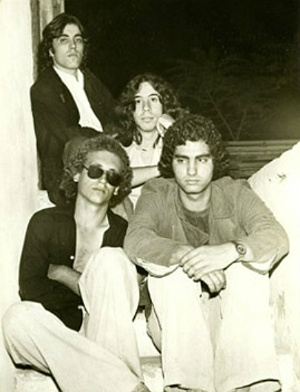 Timelord: Now let's focus on the album's lyrics. I believe that despite the fact that the record was released after the political changeover (the collapse of the junta in 1974), there is still a lot of symbolism in your songs. Was this an effort to avoid censorship? ... "As the snow melts I’ll raise my voice"... Of course in other songs there are more obvious lyrics; "… a stranger will be a brother too…". You were musically nurtured during the 1967-1974 dictatorship. How did this affect you?
Timelord: Now let's focus on the album's lyrics. I believe that despite the fact that the record was released after the political changeover (the collapse of the junta in 1974), there is still a lot of symbolism in your songs. Was this an effort to avoid censorship? ... "As the snow melts I’ll raise my voice"... Of course in other songs there are more obvious lyrics; "… a stranger will be a brother too…". You were musically nurtured during the 1967-1974 dictatorship. How did this affect you?
T.A.: There were some songs that didn't make it onto the album and some songs on the album like "Our Fight" or "As the Snow Melts" that described the political situation of the time. Other songs were of a much different, distanced nature, products of clear artistic expression. From 1972-1973 when Frog's Eye was illegally putting up posters in the streets during the junta years till the release of our album in 1976 after the political changeover, censorship was still present and this affected our lyrics. As adolescent students during those hard times we were taking part in the socio-political struggles of the greek people at the same time being concerned and loving what we were creating.
Timelord: You created the artwork on the album cover personally. Tell us about it.
T.A.: I had designed 4-5 monotypes in order to use them as covers for a possible Frog's Eye record. That's the reason why you see a one-eyed frog on the cover. I was the only one who was interested in the design of the cover. The photographs on the album were shot at the centre of the then small Bournazi square, when the shops that are there today didn't exist. Nowadays the cover has become a significant element for the recognition, promotion and distribution of the album.
Timelord: Right after the album's release, the band broke up because of army service obligations. In a regrouping effort in 1980 your equipment was stolen twice. Somewhere there you left the album to its own destiny (and what a destiny!) and everyone of you followed their own paths...
T.A.: After the band had broken up, I was the only one with an interest for the album. Despite that fact, I tried by myself to buy the rest of the rights from the label, so that they wouldn't be in someone else's hands, at the time not knowing - neither me nor the label really knew anything - about its international success. The 1980 line-up had an experimental character; it included a new guitarist, Dimitris Katsikaris, one of the original members of Frog's Eye. As artists, we insisted at the time to stay amateur. In the end this new effort was abandoned because our equipment was stolen and certainly because the changes that the political changeover had brought to the local music scene had in the meantime led to the dominance of other musical forms in the local industry.
Nikos Grapsas' career as a composer after The 4 Levels is well-known. He was the founding member of Dynameis tou Aegaeou ("Forces of Aegeon"), Avaton and other traditional music groups. He is a respectable researcher, composer and musician.
Marios Giamalakis recorded in 1983 with some common friends his personal debut album Entos Schediou Poleos ("Within the City Plan"); I participated in that recording. In 2004 I produced his second solo album In the Internet. He still remains a sensitive artist.
Christos Vlahakis lives in Holland and visits Greece every summer with his family.
Timelord: Tell us about the second life of the group that started in 1996 when Wipe-Out! Records reissued your album and lasts till our days.
T.A.: Actually there was only one life of the band. All that's happened ever since the Wipe-Out! release is only related to the album itself. It seems that the album got angry at us that we left it all alone in 1976 and decided to do everything by itself - with a huge success, I must confess! Twenty years later, in 1996, with us ignoring the whole thing, the album was released for a second time at the record shops. This was an initiative of two new producers, Thodoris Kritharis and Greg Vaïos, owners of the Wipe-Out! Label; we appreciated their effort a lot and so we helped by designing and printing a new inlaid with supplementary information. It was at that time that I finally managed to obtain the complete rights to the album having in mind a possible future CD release.
Timelord: I’ve read somewhere that there are thoughts for one new reissue of the album, this time containing extra material. Is this true?
T.A.: There's some demo material recorded in 1975-1976 and enough songs that we didn't record back then. There is also (and I'm persistently searching for it in the archives of state TV) the whole material of the ΕΙRΤ video-tapes from 1975/1976; these included many unreleased songs plus a few songs from the album recorded differently. The decision about a new reissue is yet to be taken.
Timelord: Are you thinking to bring the band together again, even just for jamming? Or maybe an appearance at the Ilion Rock Live Festival?
T.A.: Last Christmas (2009), οn my own initiative, after 33 years we got together and jammed for 2-3 hours in a studio at Ilion. A live gig or a new release would be another future project.
Timelord: Mama Africa Art Festival… You are one of the organizers...
T.A.: Just like with the Ilion Rock Live Festival, I'm also one of the basic founding members of the organizing committee for the Mama Africa Art Festival. These days I'm cooperating with - I'm actually producing - two new bands, Rebetoven and September. With September in particular I'm about to produce a series of recordings of my own songs; thus I believe that with their help I'll be able to present them to the public some time soon.
Timelord: The Simple Minds' song "Film Theme" (from their album Real To Real Cacophony) that was released in 1979 is exactly the same - note-by-note - with your song "Tou Trelou i Salpinga" ("The Insane Man's Trumpet"). Your album was released in 1976...
T.A.: I do not wish to make any comments. When we informed our label about this, they were just indifferent to it. Anyone can listen and compare both songs for similarities.
Timelord: To wrap things up, I don't know how you feel about it but I, as a fan of psychedelic rock music, feel proud that Greece has offered to the people a band such as The 4 Levels of Existence…
T.A.: All of us feel happy and proud. And all that is happening with the song ("Run This Town") is unprecedented even for the American music industry, because it is nominated for eleven more prizes in 2010!!! I'd like to end this with an excerpt from my forthcoming speech at the Urban Music Awards:
"We tied up those moments with our dreams, patiently dedicating most of the free time of our puberty to studying music and forming bands for a concert, even for just one rehearsal. The prize is dedicated to the whole community of rock band members that in those times gave their complete selves in order to fulfill their dreams about music in their lives - most of them without even tasting the satisfaction of a recording session, and lots of them deserving more than we do.
Before us many played better music and after us many will write even better music."
Tags: Τα 4 Επίπεδα της Ύπαρξης, Θανάσης Αλατάς, The 4 Levels of Existence, Athanassios Alatas, greek rock scene, psychedelic rock, interview
Best sounds of 2013
by Timelord Michalis:
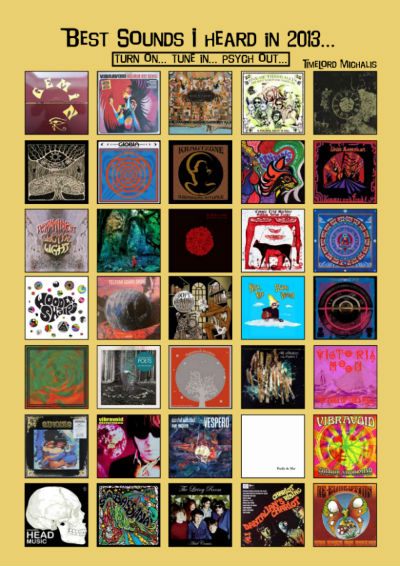
I. Albums:
(Note: two No. 1s and fourteen No. 11s)
11. THE LUCK OF EDEN HALL - Victoria Moon (self-released)
11. THE MOVEMENTS - Like Elephants 1 (Crusher Records)
11. PARIR meets ELECTRIC MOON - The Paper Moon Sessions (Sulatron Records)
11. TECHNICOLOR POETS - All That Is Solid (Kommun2)
11. NIGHT BEATS - Sonic Bloom (The Reverberation Appreciation Society)
11. THE ENTRANCE BAND - Face the Sun (Beyond Beyond Is Beyond)
11. NICK RIFF - Escape Velocity (Riffdisc /Cosmic Eye Music)
11. SOFT HEARTED SCIENTISTS - Whatever Happened to The Soft Hearted Scientists (FdM Vol.38, Fruits de Mer)
11. TELSTAR SOUND DRONE - Comedown (Bad Afro Records)
11. WOODEN SHJIPS - Back to Land (Thrill Jockey)
11. LAMP OF THE UNIVERSE - Transcendence (Clostridium Records)
11. COSMIC TRIP MACHINE - Golden Horus Name (Nasoni Records)
11. NO MAN'S LAND - Unprotected (Anazitisi Records)
11. GARDNER JACCO - Cabinet of Curiosities (Trouble In Mind Records)
10. PERMANENT CLEAR LIGHT - Beyond These Things (Havasupai Records)
09. SPIDS NOGENHAT - Kommer Med Fred (Bad Afro Records)
08. SENDELICA - The Kaleidoscopic Kat and its Autoscopic Ego (Vincebus Eruptum Records)
07. KRAUTZONE - Kosmische Rituale (Sulatron Records)
06. GIOBIA - Introducing Night Sound (Sulatron Records)
05. KIKAGAKU MOYO - Kikagaku Moyo (Cosmic Eye / Sound Effect Records)
04. THE DEAD-END ALLEY BAND - Whispers of the Night (Nasoni Records)
03. ONE OF THESE DAYS & THEE HEAVY RANDOM TONE COLOUR LAB - A Peaceful Nacht in Hell (self-released)
02. ROSE WINDOWS - The Sun Dogs (Sub Pop Records)
01. ii. VIBRAVOID - Delirio dei Sensi (Go Down Records)
01. i. PURPLE OVERDOSE - Gemineye (The last ever recordings) (Anazitisi Records)
II. Various / re-issues / EPs / singles:
(Note: except No. 1, all others in alphabetical order)
* DANTALIAN'S CHARIOT - Chariot Rising (LP, Wah Wah)
* DEAN ALLEN FOYD - Dean Allen Foyd (10"EP, Crusher Records)
* DREAM - Rebellion (LP, Pseudonym)
* ELECTRIC MOON - You Can See the Sound of... (10"EP, Sulatron Records)
* GOAT - Live Ballroom Ritual (2LP, Rocket)
* LIVING ROOM - Acid Comes (LP, World In Sound)
* SPACE AGENCY - "Bombay Potatoes" / "Purple Power" (7", Market Square Records)
* SULA BASSANA - Dreamer (10-year anniversary) (LP, Sulatron Records)
* VARIOUS ARTISTS - Re-Evolution: FdM Sings The Hollies (LP, Fruits de Mer)
* VARIOUS ARTISTS - Shrunken Head Music (2x7", Fruits de Mer)
* VARIOUS ARTISTS - The White (7"EP, Fruits de Mer)
* VESPERO - "Careful With That Axe, Eugene" (7", Fruits de Mer)
* VIBRAVOID - Colour Your Mind (7"EP, Fruits de Mer)
* VIBRAVOID - Distortions [Re-mastered] (2LP, Stoned Karma)
1.SIMONES - 20th Anniversary (4LP box-set, Headspin Records)

